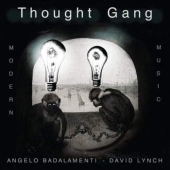
Thought Gang ( Lynch David / Badalamenti Angelo )
Thought Gang
Label: Sacred Bones
Genre: Electronica / Ambient / Experimental
Availability
- CD €14.49 Dispatched within 5-10 working days
In the years following, fragments and working versions of Thought Gang material would make appearances in everything from a Lynch-helmed Adidas commercial to scenes in Hotel Room, Mulholland Dr., Inland Empire, deleted scenes from Fire Walk With Me, and most expansively utilized in Showtime’s third season of Twin Peaks. “Frank 2000” and “Summer Night Noise,” as well as an alternate instrumental mix of “Logic and Common Sense,” would score scenes from season three and aid in defining the show’s distinctly experimental, noisetilted soundtrack.
“It’s sort of like jet-fueled jazz in a weird way…but it’s all based on stories,” says Lynch. “It’s Modern Music.”
Those two words seem to efficiently capture both Thought Gang’s essence and distinctively genre-less genre. Quite often music that finds release beyond its decade of creation experiences a bit of an aural patina resulting from the process of marinating in the ether of time. Perplexingly, Thought Gang retains a contemporary quality difficult to quantify. Fittingly, the resulting album somehow still sounds “modern” and will continue to remain “modern,” decades upon decades after is creation.
